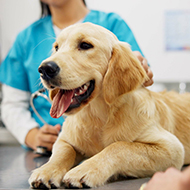Liverpool vet school celebrates 120th anniversary
William Owen Williams was invited to transfer his vet school from Edinburgh to Liverpool.
The University of Liverpool’s School of Veterinary Science is celebrating its 120th anniversary this month.
The milestone will be marked on 26 October with a celebration ball and the 2024 Barrie Edwards Memorial Lecture delivered by former RCVS president Niall Connell.
When the school was established in 1904, the Port of Liverpool had the biggest cattle trade in Europe and horses were still used as transport to and from the dock. William Owen Williams was invited to move his New Veterinary School from Edinburgh to Liverpool and local shipowners involved in the transport of cattle funded the new school.
In the century since then, the school has seen many landmarks.
In 1932, the first textbook on veterinary pathology in the UK was published by Sydney Gaiger, professor of veterinary pathology, and his colleague Gwilym Davies.
A facility dedicated to research into veterinary reproductive disorders was created in 1967 with funding from the Wellcome Trust. The facility contributed to advances in the development of reliable assays for reproductive hormones. In 1991, a £1.4 million large animal hospital was opened at Leahurst.
More recently, the school has seen the launch of the Feline Healthy Ageing Clinic in 2018 to improve the health of cats over seven years old, and in 2023, research by dog behaviour experts at the university formed the basis of a Merseyside Police dog safety campaign.
Paul Lunn, dean of the School of Veterinary Science, said: “Over the last 120 years we have created a place where veterinary students, educators and researchers can thrive. At the University of Liverpool’s School of Veterinary Science our ethos is to work together to improve animal health throughout our society and the world.
“We are incredibly proud of our 120 years and continue to strive to create accessible, equitable, sustainable, inclusive and innovative health solutions that address challenges of our time.”
Image © University of Liverpool



 The CMA has invited comments on a draft survey invitation letter, as it continues its investigation into consumer experience.
The CMA has invited comments on a draft survey invitation letter, as it continues its investigation into consumer experience.